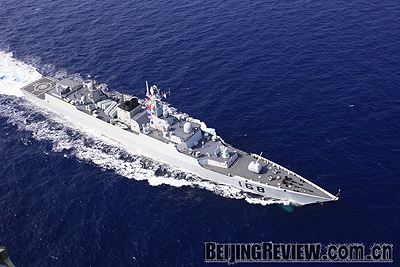|
When Chinese navigator Zheng He explored the deep blue ocean on a royal mission for the Ming Dynasty in the early 15th century, Chinese were more used to plowing the earth than plumbing the sea. But as globalization draws China closer to the world, the traditional dominance of land has faded in Chinese minds.
 |
|
OCEAN COOPERATION: Chinese missile destroyer Guangzhou sails across the Indian Ocean to participate in the Aman 09 multinational naval exercise on March 2 (ZHA CHUNMING) |
China is evolving from a traditional country of land to an ocean country. At least, it has become a country that pays equal attention to both. As China relies more and more on the ocean, maritime security has obviously become more important. What are China's interests at sea? What are the threats to its maritime security? What should be China's maritime strategy? The Chinese Government, scholars and media are all focusing on these issues.
An important lifeline
Security studies evaluate the existing and potential threats a country faces and map out countermeasures. They have to address three issues-definition of interests, evaluation of threats and determination of countermeasures. In other words, what a country wants, what it worries about and how it reacts.
China's ocean interests cover three areas, all of which are under threat: the East China Sea, the South China Sea and the Indian Ocean.
It is no coincidence that the two oceans that Asia neighbors, the Pacific Ocean and the Indian Ocean, have the most complicated ocean environments in the world. Their complexity has to do in part with China.
China didn't have to respond to the rampant piracy in the Gulf of Aden. But fighting pirates has clearly become China's responsibility because many Chinese commodity ships and oil tankers pass through the area every day.
| 